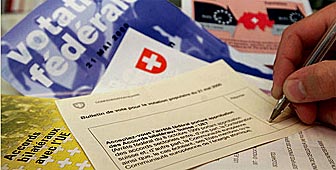Swiss voting patterns likely to converge over bilateral accords

As voting day on the bilateral accords with the European Union grows nearer, opinion polls suggest that French- and German-speaking Swiss are likely to support the accords in equal number, although for widely-differing reasons.
In December 1992, the Swiss narrowly rejected membership of the European Economic Area. However, the “no” vote was more or less confined to German-speaking Switzerland – in French areas, the “yes” vote was 30 per cent higher than among the German speakers.
That kind of disparity is unlikely this time around. Indeed, recent opinion polls suggest there could be more yes votes in German-speaking Switzerland. However, political scientists believe the two sides of the so-called Röstigraben – an imaginary divide between German and French Switzerland – will be voting yes for very different reasons.
“The difference is an intellectual one,” says René Schwok, of Geneva University’s European Institute. “For the French-speaking parts, the bilateral agreements are a step towards EU membership. For German-speaking Switzerland, according to all opinion polls, they are a way of avoiding EU membership.”
Schwok is the co-author of a report on the impact the bilaterals will have on Geneva, and on regions bordering France. He says French-speaking cantons are clearly more concerned about some accords than others. Unlike German- and Italian-speaking cantons, people in western Switzerland are not too concerned about the agreement on overland transport, as far fewer 40-tonne trucks will be passing by their front doors.
At the same time, the accord on the free movement of people is likely to have the biggest impact, as it will be easier to attract foreign workers to cities like Geneva, and for that matter, Basel. But they do not envisage an influx of cheap labour.
“Those who will come are likely to be high-earning professionals. And if they work in Geneva or Basel, they’re likely to live in France, as there’s not enough room in these cites, and what housing there is expensive.”
Schwok’s study also explodes the suggestion by opponents of the accords that a no vote would leave intact the current status quo in relations between Switzerland and the EU.
“A no vote would be an economic, political and identity mess for Switzerland,” he told Swissinfo. “Many businesses have already anticipated a yes to the bilaterals, and in the case of a no, they could simply leave Switzerland, so there would be a diversion of trade and investment.
“On the political level, there will be more instability, and internal clashes between French- and German-speaking Swiss. A no to the bilateral agreements would be a victory for the far right. To say no is to say that the Swiss don’t consider themselves to be true Europeans, and that they can live outside the whole evolution of the continent.”
by Roy Probert

In compliance with the JTI standards
More: SWI swissinfo.ch certified by the Journalism Trust Initiative
You can find an overview of ongoing debates with our journalists here. Please join us!
If you want to start a conversation about a topic raised in this article or want to report factual errors, email us at english@swissinfo.ch.